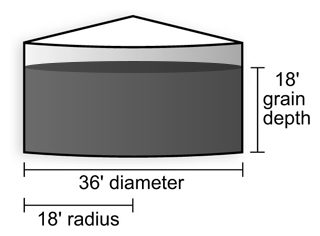Keep Stored Grain Cool and Dry to Extend Storage
Feb. 20, 2015
Keeping stored grain cool is important as outdoor temperatures fluctuate and eventually start to warm this spring, a North Dakota State University Extension Service agricultural engineer advises.
Don't Neglect Stored Grain this Fall and Winter
November 9, 2012
As most dryland corn producers know, you cannot assume that the 2012 corn in the bin has not been contaminated by molds, including mold species capable of producing mycotoxins. The only defense against mycotoxin contamination in corn is to manage the grain moisture content and grain temperature to minimize mold growth in the grain.
Recommendations for Storing Drought-Stressed Corn
August 31, 2012
As most rain-fed corn producers are well aware, this year’s hot dry conditions have resulted in lower yields with moderately lower test weights. They have also brought concerns about potential mycotoxin contamination in the grain.
Managing Large Grain Bins for Potential Mycotoxin Contamination
If mycotoxins are suspected in corn, grain depths in large bins may need to be adjusted to facilitate quick drying.
September 14, 2012
Estimating the Tonnage of Silage in a Bunker Silo
September 28, 2012
Some dryland corn producers this year turned to silage production to get the most value from their low-yield crop. Once stored, questions have come up on how to estimate the tonnage of silage in a bunker silo.
How to Estimate Bushels of Grain in a Bin
Larger Grain Bins May Need Added Fan Power
October 21, 2011
Many farmers are building larger grain bins than were common 30 years ago. A typical on-farm grain bin traditionally was 27 to 36 feet in diameter and would store grain to a depth of 18 to 22 feet. Many new grain bins are 42 to 48 feet in diameter and store grain to a depth of 28 to 32 feet — almost three times the volume of the earlier bins.
